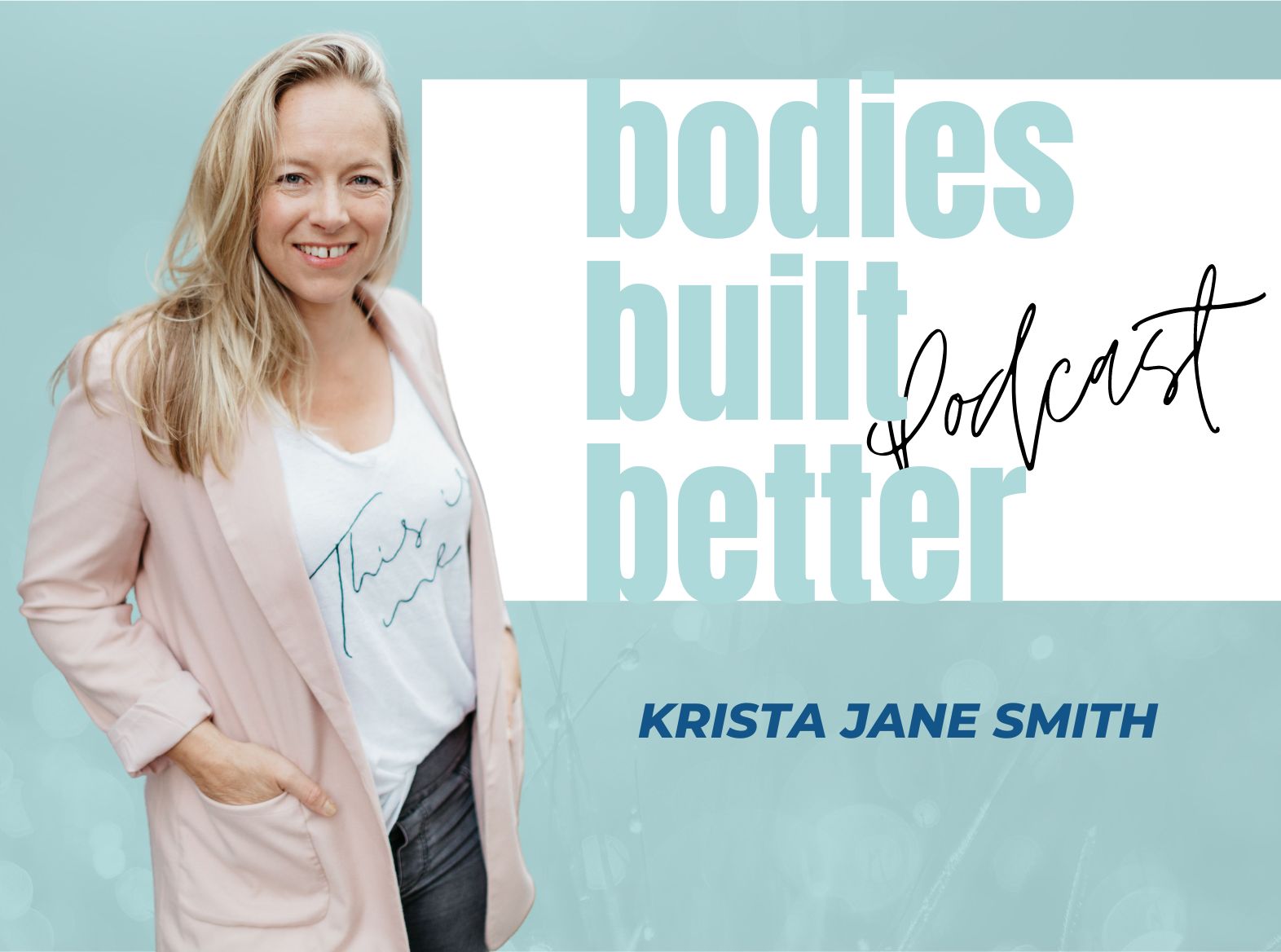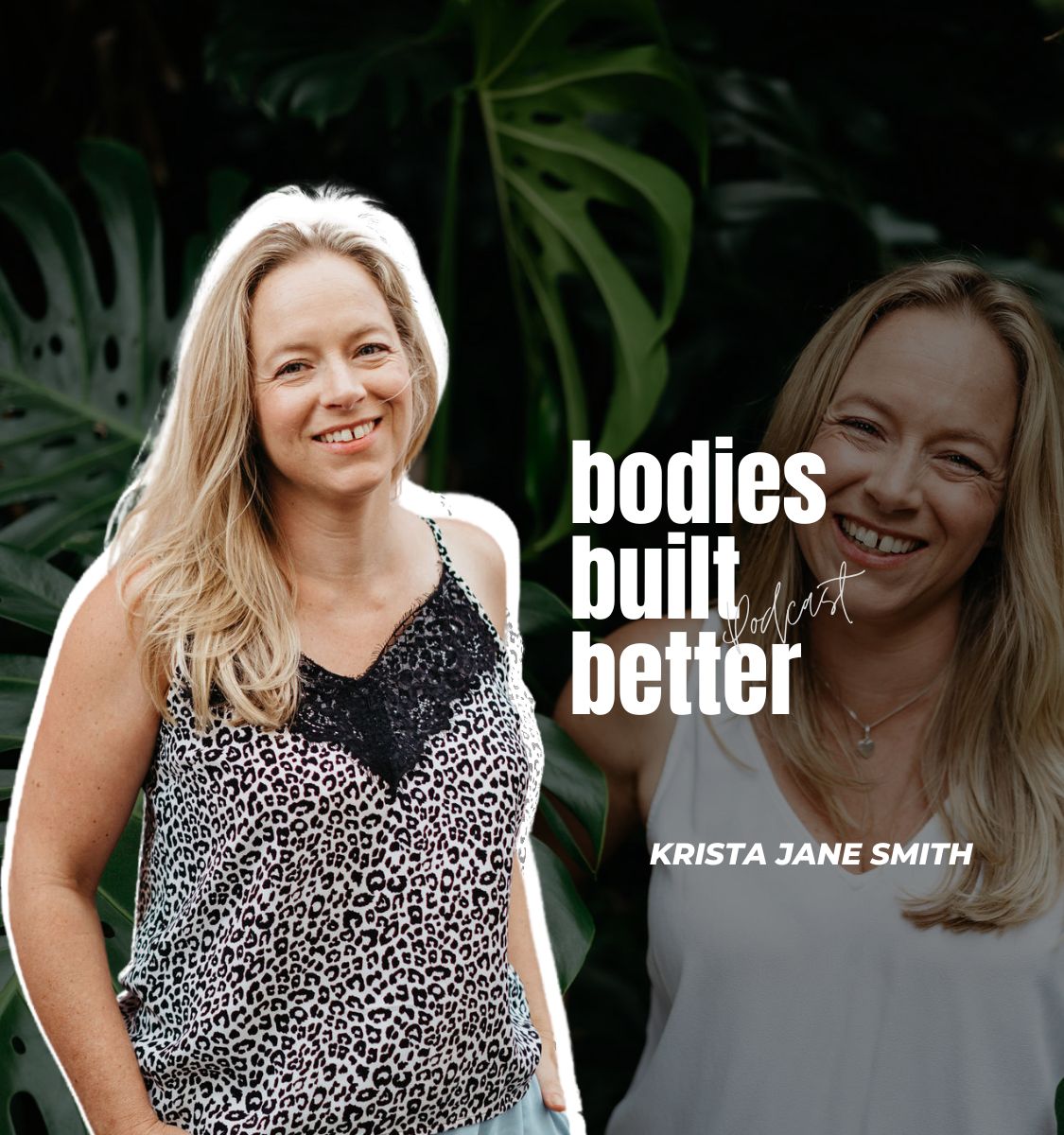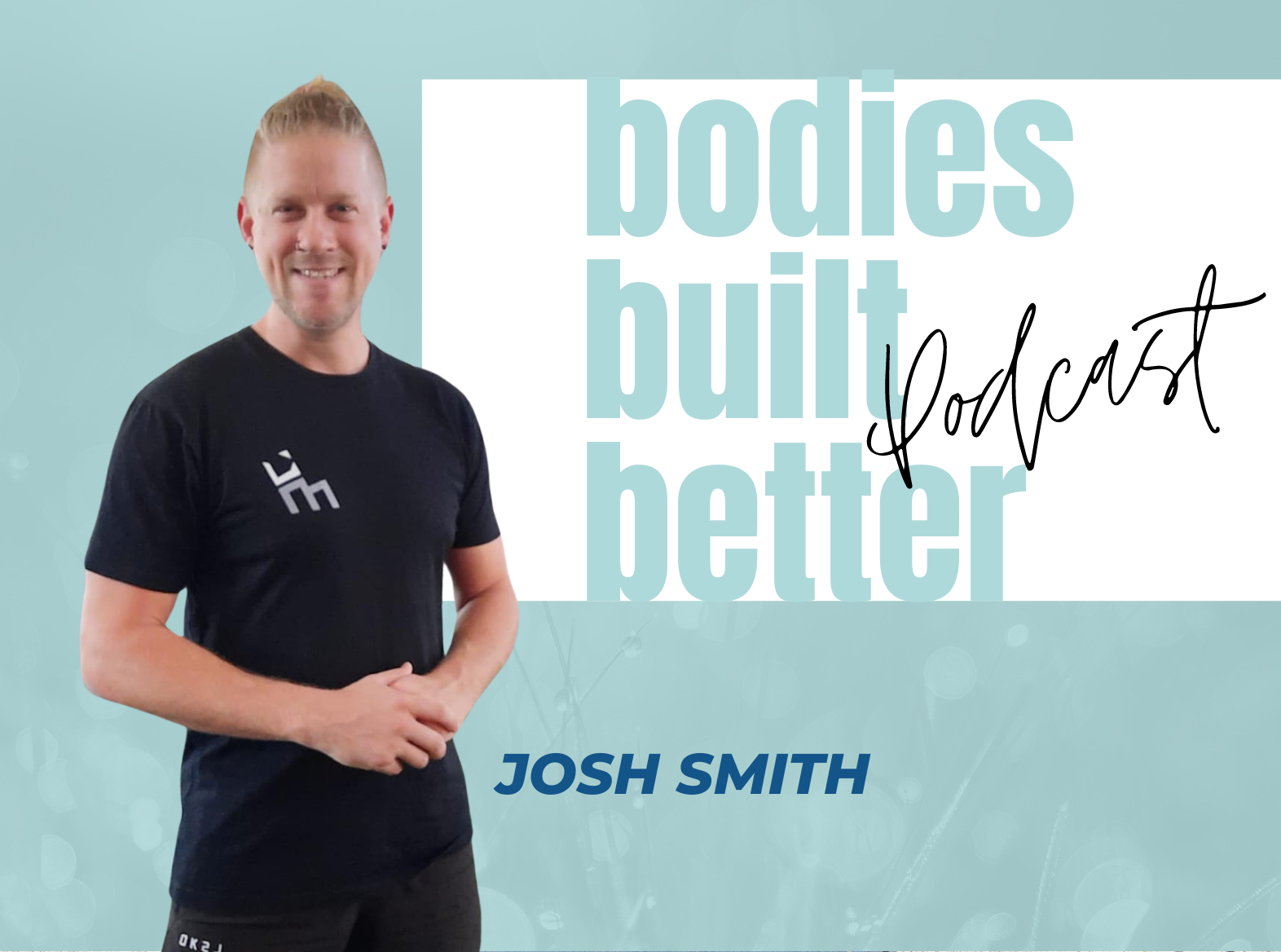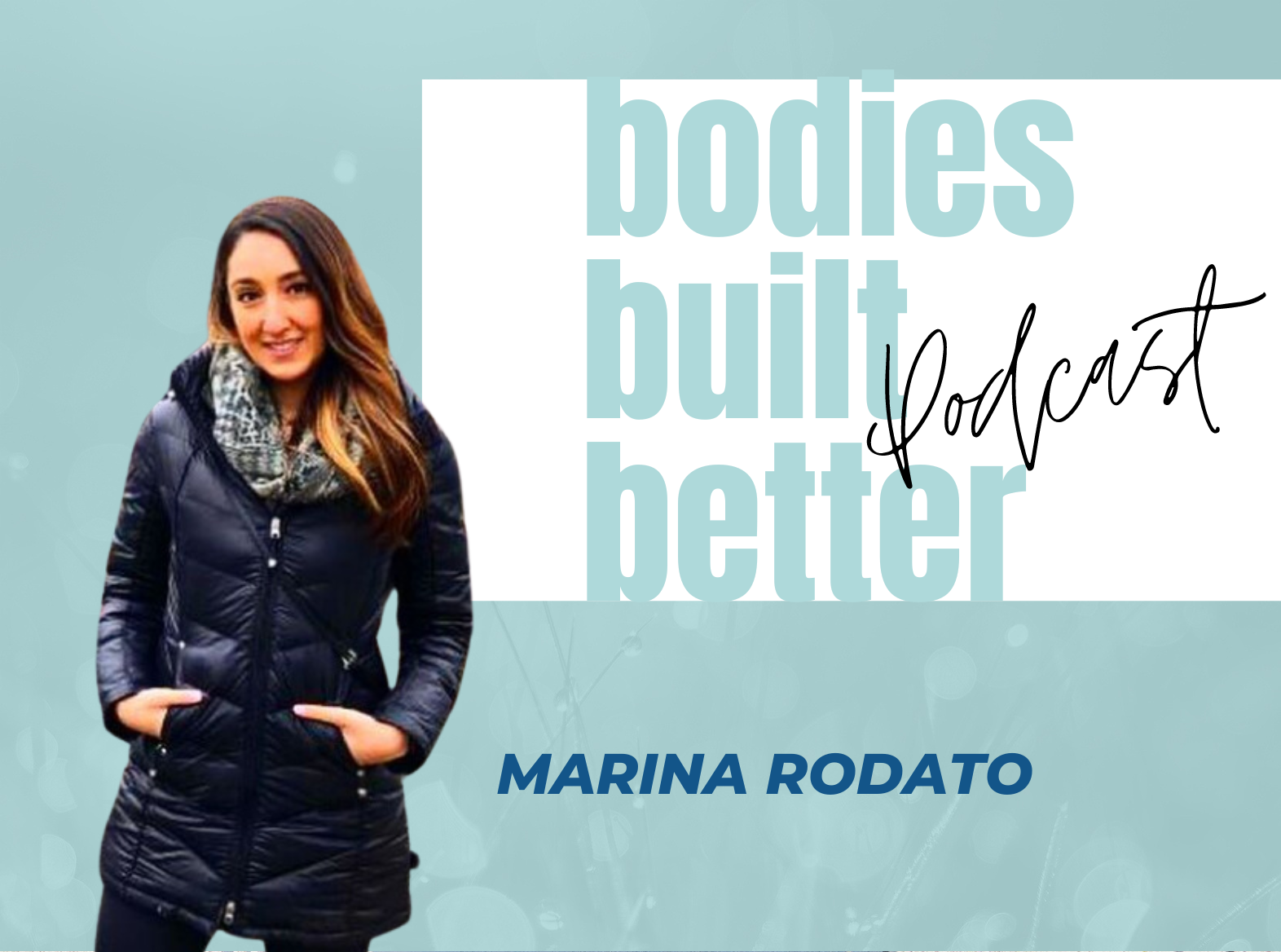Tapping Into Your Inner Power and Transform Your Life
Jackie 3:29
KJ, thank you so much for chatting with me today. Welcome to the Bodies Built Better podcast.
Krista 03:35
Thank you, I’ve been waiting for ages to come and chat to you.
Jackie 03:38
This is so–I’m so excited. Because what the listeners don’t know is that I’ve been coached by you for a little while now. And you’ve made such an impact on my life. You have this incredible ability to see people really see people and see everything that they are capable of and all their amazingness that and all the bullshit that we tell ourselves, you could see that too. And yeah, you just–you’ve helped me so much. And whilst this episode is about EFT, Emotional Freedom, Technique and Tapping, you are so much more than that, and you do so much more and to start, can you give us a little bit about you and what you do and how you came to be this incredible human?
Krista 04:39
Begin. Thank you for your lovely words. It’s just been a joy to be on the journey with you. And I guess to answer your question, How did I come to be where I’m at? Oh my god, where do you begin? Well, you know, like my own childhood shitstorm story probably pushed me to be everything that I am now. And I think you know, all of those harder experiences in your growing up kind of bring you to the opportunity to step more fully into your truth and your power. And I guess that’s what my work is really about. And you know, like you said, I, I’m good at calling people out on the bullshit, but hopefully in a gentle kindness. Because I do believe, you know, we all have this incredible ability to create what we want in our lives, but it’s our–it’s our story, it’s our past that kind of shapes, whether we are able to step into what we really desire, or whether it’s the very thing that you know, all these struggles that we’ve had, we allow them to define us. And we allow that to become the story we tell ourselves, then it really is a framework for kind of more of the same. So for me, how did I get into EFT specifically? I was actually well, how far back do we go, Jackie? I’ll start with I was living in a ski resort in Canada. And, you know, things were really good. But there was this like, underlying kind of–I was kind of, I guess I was depressed. And looking back now, I was probably anxious. I wouldn’t call myself anxious. But yeah, I think I was a bit depressed and anxious. Anyways, I started seeing a psychologist and she used EFT. And it profoundly changed my life when I started using the technique. So Malta quite intuitive, I guess that’s my one of my little superpowers. So at that time, I had started doing intuitive readings, I found like a way to use this very strange and use it to help other people. But what I realised was after a while, I mean, I was very fortunate to be good at it, and I had a good following and, but what I realised was people will just come back and ask me the same question six months later, and I just got tired of people saying, when I’m going to meet the man of my dreams, or money, or was just like–well, no, because nothing’s changed. And I realised that just telling people, here’s what you can expect coming up for you. The only reason any intuitive can ever tap into that kind of thing is based on your energy and your feeling. And you’re thinking of right now. So it’s like my, I mean, I’m a–I’m highly empathic. That’s what makes me good at the intuitive part, right? So I would just tune into somewhat like someone’s energy and where they’re at. And then it’s like, okay, well, based on this, it’s you can feel into what is coming for them. So what I realised, though, was that it’s incredibly, like, disempowering to tell someone what to, you know, like, here’s what you what you’re likely to experience, because it’s just based on their past. So what I started to do was use my intuition to find what is actually blocking them from creating what they want. So whether that’s the relationship or the money, or a business or an increase in the change in their performance in some way. So I started to really kind of hone in on what has happened in their past that is preventing them from stepping into this. So once I started to use my intuition for that part, and then I started adding in tapping things, but it was remarkable people started getting these really incredible changes in their lives. So after that, I started seeing these results. And I just became obsessed with EFT basically, because I was like, okay, wait has changed my life, I’m watching these people change in front of me. And they’re no longer asking these questions because they’re empowered, and they feel like they can change their life. So and then, of course, down the track, then you’d start to see the results of their change in energy and their changing thinking. And then their life starts to change. All of a sudden, they’re with the guy, they’re making the business, they’re making the money, and their performance has started to change. So yeah, so that’s what happened. I started to use the EFT and then I got obsessed and did all of the trainings and eventually learn how to teach other people how to do EFT and became a practitioner.
EFT Tapping For Focus and Productivity
Jackie 09:01
Incredible. And how many of those stories do we tell ourselves? There’s just so many and I have to–I don’t know if you have picked up on my energy today, but I did some tapping and it just it really, it really does for me and specifically for today. Just Oh, just feeling a bit lighter, which is nice and a bit clearer. And Saturday’s great.
Krista 09:38
the same things like you know, I start to get excited like, oh, okay, 15 minutes, like getting all excited. And yeah, we’re excited to get the more heart rate changes. And then I’m like, wait a minute. So actually, I use EFT for focus as well. Like just, okay, take a second. calm the body down, do a little bit of tapping just so that my brain works more effectively before I even jump into something where I need to use it.
Jackie 10:02
Yeah, same. Exactly. Oh, and I find that my brain, yeah, needs to not be thinking on all of the things, because I’m always in my brain. Yes. And can you tell us what those who are wondering what is EFT?
Krista 10:21
I know, it sounds like what did someone say the other day electronic fund transfer.
Jackie 10:28
That’s exactly I was telling someone about how I was going to talk to you and about EFT. And he’s like, what? I didn’t get money. Please explain.
Krista 10:40
Yeah, so EFT stands for Emotional Freedom Techniques. Like with an S, there’s multiple. And to be honest, it is the fastest way I have found after looking for 20 years to change your life. It’s strange and fairly new, it was only really kind of created around the 80s. And it’s remarkably effective in changing the way we feel and creating emotional freedom. So I guess technically clinical EFT is an evidence-based practice that combines elements of exposure, and cognitive therapies, with the stimulation of acupressure points at the same time. So what the heck does that mean? So it’s kind of like a cognitive, energetic, somatic modality, that really just means it’s all about the mind and the body, which is really exciting. It’s a very kind of, like, East meets West, which we’ve kind of had Eastern philosophy for a long time, a really long time, like 1000s of years. And then Western philosophy, which is rarely mind-based. So we’ve got one more body, but it’s one more mind-base. And then they started to come together, which is really, when things get interesting. And we’re putting the two together. And we use it to reduce negative thoughts, becoming more emotionally regulated, changing destructive patterns, changing your beliefs and cognitive constructs. So yeah, I guess it’s, it’s quite based on Chinese medicine, and the acupoints. So or meridian points on the face and upper body, you look absolutely ridiculous while you’re doing it, you really truly do. I’ve had like, you know, fully grown multimillionaire CEOs come in, or be I had one guy, once he was a drug dealer, huge, huge, massive, big muscley guy, just like gently tapping on his knees and these faces. And it was, it was the most actually, it was one of the most satisfying sessions, I think I’ve ever had to watch this man peel back the layers and reclaim his baby self. And it was–it was truly amazing. I mean, he was going he came because of the anger management to be honest. And then got back to this unbelievable place where it was just like you saw this huge muscley guy just kind of melt into and just like this softness, and, you know, uncovering all these reasons why he had become such an angry person, and, you know, turning off the brains response to all of those. And yeah, his life really, it was unbelievable, to watch how his life completely changed. So, anyway, we are down a rabbit hole here. And I really
How Our Experiences Shapes Who We Are
Jackie 13:12
And I really loved that rabbit hole. Because I think, you know, as soon as you say, you know, you’re this big, muscley guy, and he starts to soften, and calm, I feel like people are maybe more so men can look at that and go, “Well, that’s weak, you got to stay hard and strong.” But really, by doing that, it’s it has changed his life
Krista 13:35
Oh profoundly he’s so much safer and who he is, it looks like when you’re angry, that you’re you know, you’re tough and you’re protective. And it’s like, it’s only hiding and deep vulnerability that we’re constantly running from that is like, every person can take that on board. We are born this kind of like, you know, soft, like, expansive, surrendered little self. And then we start having experience and every experience, you know, and we have these experiences that are either kind of as a baby are either teaching you that yes, your needs will get met. And you are in fact safe in the world. Or your cries don’t get it and you don’t get the connection and the safety that you need. And whether that as a baby or as you get older, there’s we just have these experiences that either affirm connection and safety or they have us believe because we didn’t have the resources at the time of that incident, whatever it might be when you got humiliated in school or your father left or you watched your, you know, mom and dad fight and it was abusive or whatever, whatever the moment was, and it doesn’t even this is crazy. It doesn’t actually have to be a like massive trauma. It can be just these, you know, smaller moments where we didn’t feel safe. We didn’t feel supported. We didn’t feel the love we didn’t have what We needed in that moment. And we and if we don’t get that often enough, then we start to build these protective mechanisms to make sure that we never go back to that feeling. Right. And that’s what I mean by that, you know, we become tougher and tougher, or, you know, we start operating in a certain way, where perhaps we’re more inclined to really plan out our future, and we’re very obsessed on exactly how things are going to happen, we become more controlling, or perhaps we focus on controlling our diet, or we go into avoidance or more in shutdown, where we just don’t talk about feelings, we just pretend that we don’t have them, which is ridiculous because every single human is a–is a human being, you know, and we are feeling-oriented, like it just, it’s who we are. So it doesn’t matter whether you’re male or female, you will be affected by your experiences. And, you know, depending on your conditioning, and the amount of resources and support you had through your life will tell you, you know, well, yeah, that’s how we form our beliefs, really, about who we are in the world, and what is really possible for us. So it’s the story we’ve created, it’s not, and it may have been true in a moment, but what we start to believe is that what we experienced as like a five-year-old, is now what we believe about the rest of the world. Right? You know, okay, so you, let’s say, you fell over, and you had this horrible accident, and someone just told you, you’re fine, you know, you know, your whatever, and that you just get up, but no one comes to your need. And, you know, no one looks like they care. And in that moment, you just, you start to believe no one’s there for me, or it’s weak to be hurt, or, you know, there’s 1000, things we could decide, and that very impressionable moment where we had emotion come up. And if we had emotion come up, and we had support, or we had been taught the resources to regulate those emotions in that moment, the beliefs that would have been formed would be completely different. And that’s the problem is that in those moments, we didn’t have what we needed to have the emotional support, so that we can actually process the emotional charge that comes up, if we can process the emotional charge when it comes up, we stay big and expansive. And like the world is your oyster, you can create anything, but the more of those experience that you know, adverse childhood experiences that we have, and we can have adverse childhood experiences, that’s okay. It’s when we don’t have the support and connection, or we haven’t been taught how to regulate that it becomes a bigger problem, kind of, you know, later in life. And it doesn’t just apply to you know, like, the way we walk through life, it, it applies to your relationships, it applies to your ability to make money, it applies to your ability to have a really fulfilling sex life, it applies to everything, your level of health in life, it’s just it, all of these, basically zero to eight is so impressionable. And as you get older, unless you are consciously kind of looking at your responses and reactivity in life, and where you’re finding the stress and resistance, if you don’t use that to inform you about what’s really going on with you, and go deeper and find out what do you really need in this situation, you’ll just use your default mechanisms to keep avoiding the pain. Right? So it’s either we’re kind of moving away from it or toward it. And honestly, as adults or older you get, the harder it is to stay open. It’s kinda like, you know, we’re kind of like a, I always think of it as like, a kind of seems like bright and light to me, as babies. And then as these experiences come on, we kind of get kind of more and more tight, and contracted. And that’s why it can be really hard when you kind of start to consciously try and create things differently in your life, you know, whether it’s, you know, you want to increase your athletic performance, or you want a relationship in your life that you’ve never had, or, you know, you want to make more money and you haven’t been able to make money before or you’ve got to go and look at like, what part of me says this isn’t, you know, isn’t possible for me. Where did that come from? And then what does that old part of me really need? Gosh, we have gone down a rabbit hole.
Questioning Our Thoughts: Confronting The Baggage We Carry
Jackie 19:27
Because these questions can be so confronting, and we don’t. I mean, I certainly didn’t know that I could you call it baggage, I had stuff, right? So I didn’t realise until, I guess, taught by you to actually question why I’m feeling what I’m feeling and what that meant. And it’s so funny. I actually had a conversation with someone the other day about, about asking questions and the me asking questions is like, it’s a bad thing. You can’t ask questions because that reveals how dumb, this is what I’m telling myself how dumb I am and like, Where the heck did that come from? And I remember a time in primary school. I had, I was trying to ask a question. And the teacher, I know, obviously, looking back, it’s probably wasn’t me, but she was a bit frazzled in the moment. So a lot going on. And she just, like, kind of yelled at me and sent me away. So that quite dramatic. scuttle away. But um, I thought, well, yeah, I mean, that’s where, why I don’t want to ask any questions,
Krista 20:50
You’re going amazing. And this is the thing I think people kind of like a think, oh, it has to be something really big. Like, it must have been a parent that died or your family broke up or, you know, your–you had an illness or, you know, you you were abused or something it’s people perceive it as has to be a really big trauma, which it can be. But often it’s these little moments. But it’s these moments where imperfect example, in your story where you had a huge surge of emotion, something happens. And that created us a huge surge of emotion in your body. And you didn’t have the skills to regulate it and what your brain then told you was, there’s something wrong with you. Rather than if you had someone come over and go, Oh, Jackie, you’re feeling a feeling really, you know, maybe you’re feeling really embarrassed right now because you don’t know the answer. That’s okay. It’s okay to feel embarrassed. But we’re not, you know, especially child children of the 80s. The children of the 80s. And the 70s. Definitely recognise this button is like, you’re right. You’re right.
Jackie 21:58
Get on with it.
Krista 21:59
Get on with it, right where we were, you know, I mean, look, they did the best they could with what they had. However, they weren’t particularly good, they were really focused on meeting our physical needs. Right. And, and it didn’t leave a lot of room for and plus, you know, the ancestry didn’t say that, you know, Maslow’s hierarchy of needs, doesn’t say, meet the emotions. First, it does get a roof over their head. You know, once that’s sorted out, maybe we’ll talk about food, you know, and now we’re at this point in our evolution, where we’ve got houses, and you know, we’re so, you know, ahead of our 300 years ago, ancestors, that we have a lot of these needs met, and we are able to reach this whole new level of evolution where we’re starting to look at emotional needs and how once we get a handle on them, we really can consciously shape our life.
The Truth About Meridian Points: Proven to Affect the Brain
Jackie 22:49
Absolutely. All right. So we went–we’ve gone into some of the benefits.
Krista 23:00
Well, okay, so what you were what we were talking about, actually, I think was the meridians and so strange, like you’re tapping on yourself, right? So we’re actually just doing these gentle little taps on the hand, face and body, upper body. And both meridians had now, you know, as I said, you know, that East Meets West kind of thing. 2000 years ago, Chinese medicine marketers, were all talking about the meridians. But in science is actually just catching up. And there was a recent study by Harvard. And I mean, really recent, that’s just come out that now proves that meridians actually exist, and that these little vascular points that are the meridian points, when stimulated, actually do affect the amygdala and the hippocampus in the brain. So and for anyone that doesn’t know those two really affect your, your stress response, and the limbic brain and your and forming those beliefs and whatnot. So, yeah, it’s really cool, because the study proved that if we stimulate those meridian points, the amygdala will deactivate, and it does so really quickly. Yeah, I know, it’s so exciting. It’s really, really cool. You know, I’ve been doing this for a long time. And at the start, it was just like, I was just going off what I was seeing in my practice, like watching people like, Oh, my God, oh, my God, it worked, you know, because people will come in after, you know, a week or two later, and they’re like, oh, yeah, everything’s changed. It was just miraculous. So for me, I was, I had this evidence coming through that kept me going, but for some people, you know, they really needed the science and it’s really, really exciting that the science is finally catching up. You know, and affirming what, for 2000 years.
Jackie 24:42
They already knew.
The Amazing Effects of Tapping: Gene Expression and Healing
Krista 24:43
Yeah, yeah, exactly. I mean, there’s it’s really, I mean, on that there’s been now there’s been over 100 randomised studies and 50. Sorry, 50 randomised control studies, five meta analysis. There’s just this so much coming out. And actually there was one in particular that just will blow your mind with a landmark study by Maharaja gene expression. And it showed that after one hour of tapping 72 genes changed expression, like what the heck, that just–I just it’s so exciting because I’m like, “I knew it was working.” And that was measured through blood tests. But what it really showed was that some genes were downregulated, or turned off, for example, like inflammation or campus suppression, and some genes were turned on, or upregulated like immunity downregulating, sorry, the stress response or tumour suppression, synaptic connectivity, and effect male fertility, UV damage, insulin regulation. I mean, it just, it’s, it’s really, it’s really cool. It’s just like, “Oh, my God, why are you talking to me after one hour?” We can–I mean, until recently, we–in the study, new–very new study of epigenetics. We didn’t even know that we could change genes and their expert I’m not change the genes, but change the, you know, the up-regulation or down-regulation of them. So, I mean, that’s just really cool. And there’s another really cool one, on cortisol production was measured by saliva activity. I got to think of this one. After–I’m pretty sure, again, it was one session, one session of tapping an hour, let’s say, the cortisol production went down by 39%. Like, what? Yeah, so it’s really, you know, like, the basis of the whole thing is really about changing your stress response. When you change us, we know what stress does to the body, like, we’ve been told this for years, and years and years. But honestly, it’s not just what it does to your physical body in terms of your health, but it’s also relates to everything that you do. Like if, if you’re an athlete, and you’re wanting to change your performance, let’s say, you’re like, “Okay, I want to I’m going to compete in this race. And, you know, I want my performance to be better.” It is all about the stress. So yes, we could look at the stress that is induced in recover, okay, we’ve stressed the body physically, we can look at reducing the stress in the body and our quickening our response time in the recovery phase, we could also look at what’s going on in the mind when I think about that race that I’m going to do, and I know that I want to improve? What is my mind actually saying about this? Well, where did you get that from? Maybe your mind says, I don’t know if I can do it didn’t work last time. And then your mind is actually recalling a memory from like, way back when you failed at something, and no one came in and said, “Don’t worry, it’s just this one thing.” If you have this resource, you can do better. Right, but you didn’t have that resource. So you started to believe that I just can’t do it. Right? So then we either go into avoidance, or we tell ourselves that we can’t do it. Or maybe we go into a pattern of self-sabotage. Like, we start the training, we go out it really hard, and then we quit just before we get the results. Right? And all of that is all stressed. Like based on the current situation physically, emotionally, what is happening in your mind when you think about it, or the thoughts that come up, or these past experiences, the EFT really is all about kind of starting to change the stress response, as you recognise what your mind is telling you about the current situation, kind of based on past so we’re working on the present stuff, but it always goes back to the past.
Where to Find KJ:
Website: www.kristajane.com
KJ’s Meditations: https://kristajane.com/meditations/
The Science behind Tapping: Research papers
Tapping video for anxiety: https://www.youtube.com/watch?v=02bN4JFx10Y
Tapping video for stress in sport: https://www.youtube.com/watch?v=DeAYnI7xRj0
If you enjoyed this episode of The Bodies Built Better Podcast please hit SUBSCRIBE and share it with your friends.
Head over to The bodes built better podcast page – https://jackietann.com/the-bodies-built-better-podcast/
Follow @jackietann_rmt and @bodiesbuiltbetter on Instagram
Got questions, comments, or feedback? Get in touch via the above social media handles


